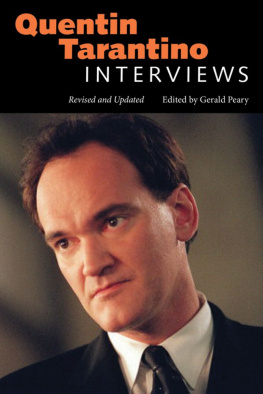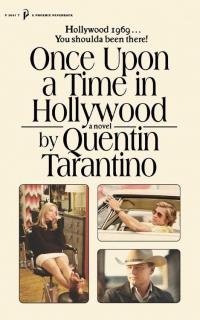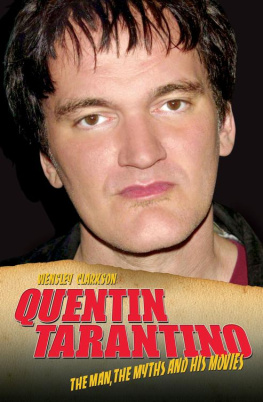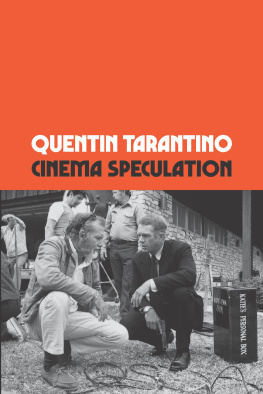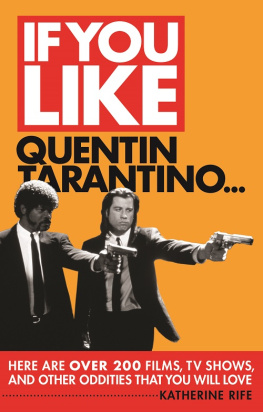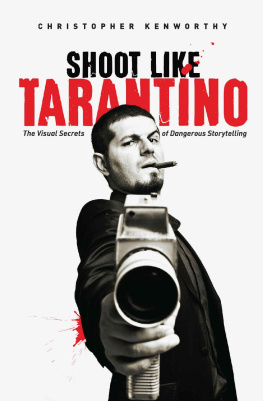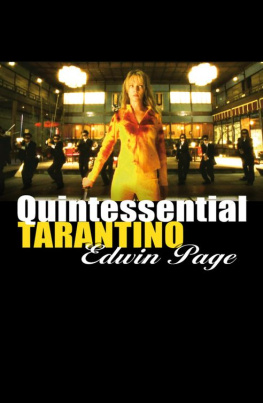Quentin Tarantino: Interviews
Revised and Updated
Conversations with Filmmakers Series
Gerald Peary, General Editor
Quentin Tarantino
INTERVIEWS
Revised and Updated
Edited by Gerald Peary

www.upress.state.ms.us
The University Press of Mississippi is a member of the Association of American
University Presses.
Copyright 2013 by University Press of Mississippi
All rights reserved
Manufactured in the United States of America
First printing 2013
Library of Congress Cataloging-in-Publication Data
Tarantino, Quentin.
Quentin Tarantino : interviews / edited by Gerald Peary. Revised and updated [edition].
pages cm. (Conversations with filmmakers series)
Includes filmography.
Includes bibliographical references and index.
ISBN 978-1-61703-874-7 (hardback) ISBN 978-1-61703-875-4 (ebook) 1. Tarantino, QuentinInterviews. 2. Motion picture producers and directorsUnited StatesInterviews. I. Peary, Gerald. II. Title.
PN1998.3.T358A5 2013
791.430233092dc23 2013023360
British Library Cataloging-in-Publication Data available
Contents
Michel Ciment and Hubert Niogret / 1992
Gerald Peary / 1992
Peter Brunette / 1992
Toronto International Film Festival / 1992
Graham Fuller / 1993
Manohla Dargis / 1994
Michel Ciment and Hubert Niogret / 1994
Gavin Smith / 1994
Peter Biskind / 1995
J. Hoberman / 1996
Don Gibalevich / 1996
Transcribed by Peter Keough / 1997
Adrian Wootton / 1998
Erik Bauer / 1998
Tomohiro Machiyama / 2003
Jeff Otto / 2003
Mary Kaye Schilling / 2004
Nick James / 2008
Kam Williams / 2009
Ella Taylor / 2009
Mali Elfman / 2009
Terry Gross / 2009
Ryan Gilbey / 2009
Henry Louis Gates, Jr. / 2012
Introduction
In this indolent age of Netflix and Hulu on demand, think back to VHS days, when renting videos meant actually having to leave your comfy flat. But the compensation back then was interacting with your favorite video store employee. You remember, dont you? That t-shirted guy or gal, embarrassingly overqualified, who didnt let a seven-dollar-an-hour salary curb an energetic discourse about film, film, film, whether European auteurist masterpieces, Hollywood genre works, or Hong Kong kung-fu?
Quentin Tarantino, twenty-eight, was exactly that appealing person, as he arrived in January 1992 at the Sundance Film Festival. He was a California-reared, self-proclaimed film geek with five intense years behind the counter at Manhattan Beachs Video Archives, where he devoured countless movies, chattered incessantly about them, and developed a game plan about making them himself. Now hed struck gold with the premiere at Park City of his first feature, Reservoir Dogs, with credits as actor-writer-director.
In AugustSeptember 1992 Tarantino accompanied Reservoir Dogs to both the Montreal and Toronto Film Festivals. Everyone who encountered Quentin (he was hardly Mr. Tarantino) met the most approachable and affable of filmmakers. Buoyed by the sudden spotlight, he had a jolly time sounding off with journalists and critics about cinema in generaljust as hed done at Video Archivesand about his movie.
He seemed to have absorbed, in making Reservoir Dogs, every type of film, grindhouse to arthouse; but hed also propped up his cinema by leaning on American literature. Among his bookish influences: J. D. Salingers Glass family tales, the hardboiled novels of Elmore Leonard, Charles Willeford, and Jim Thompson. He also grooved on pop TV: The Partridge Family and Baywatch.
In Toronto, Tarantino became the charismatic epicenter of a wildly entertaining press conference, where he was joined by Reservoir Dogs actors Harvey Keitel, Michael Madsen, Steve Buscemi, and Tim Roth. The text of the press conference is printed here, as well as a Montreal interview with critic Peter Brunette, now deceased, who was the original series editor for the University Press of Mississippi Conversations with Filmmakers series. This astute Q&A shows why his talents (and person) are so missed. With Brunette, Tarantino talked of structuring Reservoir Dogs as a dark gallows comedy: I like the idea that the audience is laughing and that, BOOM, the next minute there is blood on the walls. He also declared an unabashed romance with the all-American junk-food life style: Theres something very lovely in that, though Im maybe saying its very lovely because its my culture. Its me!
I also interviewed Tarantino in Montreal, where he confided to me a bedtime dream he once had, of attending a party at the home of director Howard Hawks, along with guests Robert Mitchum and John Duke Wayne. I also learned of his adoration for Nouvelle Vague cineastes, Jean-Luc Godard and Jean-Pierre Melville.
I asked Tarantino a favor. He was coming soon to Boston, where I taught, to meet with local press before the Reservoir Dogs opening. Is there any chance that you could drop by my Boston University course on the French New Wave and say a few words? A week later, he strolled into BU. It was mid-September 1992, and I said (how can I forget?): Class, this is Quentin Tarantino. You dont know yet who he is, because his film hasnt played in Boston. But you will: its a great first feature. The students stared at him: he looked cool (a favorite Tarantino word), even if they had to take my word for his talent.
I explained: Quentin has come to talk to us about French New Wave cinema. And away he went! Id hoped for a few minutes; he gave an hour-and-a-half, a spontaneous soliloquy about the wonders of the Nouvelle Vague, not only about the great films the directors had made (he knew these, forwards and backwards) but about their hyperbolic writings in the magazine Cahiers du Cinma. I remember him paraphrasing Godard in Cahiers enraptured by a war picture made by Douglas Sirk: What a great title: A Time to Love and a Time to Die! And any film with a title that great must be a great film!
Curiously, Tarantino didnt speak at all about Reservoir Dogs. His heart and soul were in Paris in the 1960s; and we at Boston University were too mesmerized by his storytelling to remember to videotape this onetime happening. Our loss! September 1992 also saw the first published career interview with Tarantino, a discussion with Michel Ciment and Hubert Niogret in the French magazine Positif about Quentins film-saturated childhood, his preReservoir Dogs effort to make a feature, MyBest Friends Birthday, and his two long-ago-written screenplays, True Romance and Natural Born Killers.
In October 1992 Reservoir Dogs opened theatrically in the U.S. Americas best critics wrote at length about it, praising Tarantinos precocious talents, his cheeky dialogue, his deftness with genre; but some raised objections to the films unapologetic dallying in violence. For example, Ella Taylor in the LA Weekly provided a sharp rebuke for Reservoir Dogs torture-by-straight-razor scene, labeling it an exercise in spurious, sadistic manipulation pure gratuity, without mercy for the viewer.
The questioning of Tarantinos violence has persisted through the years. The filmmaker has been consistent, interview after interview, in dismissing such criticism. Screen violence is not, he says, the same as real-life butchery, which he abhors. But he savors well-turned scenes of violence in other peoples movies, and he gets pleasure himself in orchestrating such scenes. For Tarantino, violence in cinema is a matter of taste, just as people like or dislike dance movies, or westerns. As for social responsibility, Tarantino claims that he has only
Next page
